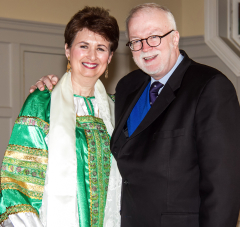

Dr. Timothy George, Dean of Beeson Divinity School, and Denise George, author and teacher, were featured speakers at Christian Emphasis Week at Judson College
Marion, Ala. – Dr. Timothy George and his spouse, Denise George, were the featured speakers at Judson College’s annual Christian Emphasis Week.
Christian Emphasis Week, a time in which the campus community annually engages in additional intentional and focused worship and study, was held in the Ramsay-McCrummen Chapel on the school’s campus January 14 thru 16. This year’s event was entitled, Following Jesus in Today’s World: Life, Race, and Prejudice, with presentations by the Georges at 11 a.m. all three days.
Dr. George, who serves Samford University as Dean and Professor of Religion at Beeson Divinity School, spoke on Tuesday. Mrs. Denise George, who works as a full-time author and speaker and serves the Beeson Divinity School as an adjunct instructor, spoke on Wednesday and on Thursday.
The common thread running through all of the messages delivered by the Georges is that all persons are created in God’s image, and that this core doctrine deeply impacts the way in which we should live with and care for all persons. Thus, on the first day of the event, Dr. George presented, “Loving the Least of These: The Sacredness of Life.” Dr. George’s talk was far-ranging, yet he framed his message with what Jesus said in the Book of Matthew: “Inasmuch as you do unto the least of me, you do unto me.”
Dr. George emphasized that all human life is sacred – from the point of conception to natural death. In October of 2009, he was part of a three-member committee that drafted the Manhattan Declaration: A Call of Christian Conscience. This manifesto was issued by evangelical Christian leaders to affirm the sanctity of life, traditional marriage, and religious liberty. The Manhattan Declaration’s website encourages supporters to sign the declaration and counts about 600,000 signatories to-date.
Dr. George used the analogy of the nineteenth century British anti-slavery activist, William Wilberforce, as an example to those wishing to protect unborn children. According to Dr. George, during the 1800s in England, Wilberforce faced strong opposition to ending the slave trade. But he worked steadfastly to end the entrenched tradition. After years of perseverance, Wilberforce won the battle – the British Parliament passed the Slavery Abolition Act of 1833.
On the second and third days of Christian Emphasis Week, Denise George, spoke to the assembly in Judson’s Ramsay-McCrummen chapel. Addressing the issues of prejudice and forgiveness, Mrs. George looked deeply into the lives of two children who had survived the Birmingham church bombing; and the other, the holocaust of Hitler’s concentration camps.
On Wednesday, Mrs. George’s presentation was entitled, “While the World Watched: Racial Reconciliation.”
Mrs. George reminded a captivated audience that on Sunday, September 15, 1963, just 50 years ago, the Sixteenth Street Baptist Church in Birmingham was shaken by the explosion of a bomb. Ironically, it was “Youth Sunday,” and the pastor was prepared to give a sermon based on Luke 23:34, “A Love that Forgives.”
But on that day, the sermon was never delivered. At 10:22 a.m. a bomb blast killed four young girls, who were buried under rubble in the basement of the church.
Mrs. George told the story of Carolyn McKinstry, a little girl who survived the bombing. But it was her friends who died. She never received grief counseling; in fact, the terrible event was not talked about very much. The child grew up with strong feelings of loss, guilt, bewilderment and anger. As an adult, she became an alcoholic.
However, Carolyn eventually changed her life through forgiveness. It wasn’t until she could forgive the Klansmen who had set off the bomb that killed her friends, that she could live again a life of purpose and faith.
Similarly on Thursday, Mrs. George’s message, entitled “Secret Holocaust Diaries: Standing with the Victims,” presented the story of a girl who became empowered through forgiveness.
Nonna, a Russian Orthodox Christian, was a refugee from the Ukraine caught in the holocaust of World War II. On August 7, 1942, her mother, Theodocia, her sister, Anna, and she were arrested and sent to a Nazi concentration camp. They spent four years in six different camps.
A total of 35 family members were interred in labor and concentration camps. Nonna was the only person of her family to survive.
However, rather than let weeds of bitterness grow in her heart, she was able to forgive her captors. Despite the horrendous acts committed against herself and family, she forgave them.
While still a young woman, Nonna came to the United States where she married a man named Henry Bannister. In her book entitled “The Secret Holocaust Diaries,” Mrs. George writes about Nonna’s experiences during the holocaust. The book became a best-seller and is in print today. Nonna Bannister died in August of 2004.
At the conclusion of the week’s event, Dr. David Potts, President of Judson College, graciously expressed his deep appreciation to Dr. and Mrs. George for their outstanding presentations. He also thanked Dr. Harold Arnold, who was instrumental in organizing this year’s Christian Emphasis Week activities, as well as students, faculty, and staff members for their support.
Founded in 1838 by Alabama Baptists, Judson College was recently ranked by the Washington Monthly among the top 60 national liberal arts colleges in the nation and the #1 liberal arts college in Alabama. The college website is www.judson.edu.



